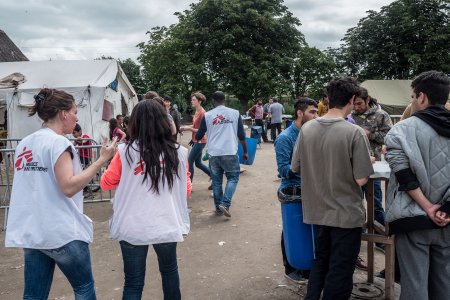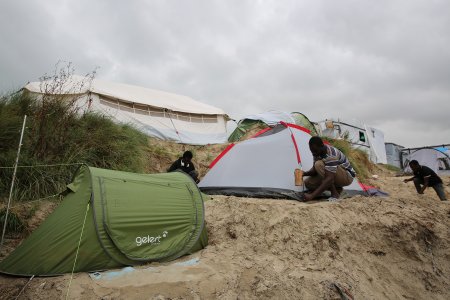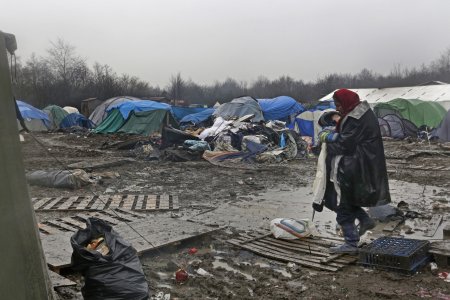
Hospitality
Elba Rahmouni
Thanks to the migrant crisis, or the reception crisis as it would be more appropriate to call it, the issue of hospitality is back in the forefront. On 17 May, the Maison des Métallos organised a conference with two social science researchers - Michel Agier and Benjamin Boudou - and an NGO manager Cécile PolettiMichel Agier is Director of Studies at the Ecoles des Hautes Etudes en Sciences Sociales (EHSS), Director of Research at the Institut de Recherche pour le Développement (IRD) and director of the BABELS research programme (EHESS), supported by the Agence Nationale de la Recherche. Benjamin Boudou is a researcher in political science at Institut Max-Planck in Göttingen, Germany. He is the author of Politique de l’hospitalité : une généalogie conceptuelle [The Politics of Hospitality : A Conceptual Geneology], Paris, CNRS Editions, 2017, and Le dilemme des frontières : éthique et politique de l’immigration [The Boundary Dilemma : the ethics and politics of immigration] Paris, Editions de l’EHESS, 2018. Cécile Poletti is a national CIMADE delegate for the Île-de-France region.to discuss existing tensions between private hospitality and public hospitality.
The debate approached the notion of hospitality from two different perspectives, one negative - denouncing inhospitality and highlighting the political failures and legal infringements committed by European host countries, and the other positive - describing the relief brought to the distress caused by leaving your home country, being separated from your family, crossing borders and arriving in a new country that will not necessarily accept you. A generic definition of hospitality« Hospitality is an institution that governs the interaction between the person welcoming (to his or her home) and the person who is welcomed (new arrival), consisting in a process of mutual familiarisation (getting to know each other, maintaining a relationship , etc.) », Benjamin Boudou, Politique de l’hospitalité, p.11was shown to be incapable of encompassing such a broad and also problematic notion, as hospitality can be both a duty for citizens (the challenge being to make up for the failures of states) as well as a criminal offence.
Political hospitality - Benjamin Boudou
During the 2017 French presidential campaign, Benoît Hamon asserted that Europe was proving itself incapable of hospitality while Marine le Pen described herself as ‘"tolerant and hospitable’" with people of her choosing. Through this example, Benjamin Boudou demonstrated the plasticity of the word “hospitality” which, when used in a political context, becomes both polysemous and polemical. In his book, Politique de l’hospitalité, he develops the genealogy of hospitality in an attempt to illustrate the politics of hospitality. During the conference, he also sought to demonstrate the existence of a political dimension to a notion which, if it is to be of any value, requires us first to define what is foreignThere is an Eskimo ritual in which strangers exchange slaps with all the members of the tribe. The purpose is to enter into contact with people arriving from elsewhere so as not to fear them..
Benjamin Boudou uses three arguments to demonstrate the complexity of the notion of hospitality: at a moral level, hospitality is scarcely compatible with equality as it demands gratitude; at a political level, it is scarcely compatible with impartiality as it is specific to liberal regimes; and a legal level, it is scarcely compatible with the application of law as it is an exception to justice. To be received by a host is to be confined to the privileged status of guest. The asymmetries specific to hospitality are very difficult to get past and, when they persist, can lead to isolation and alienation. Hence the question of how to get past them…
Risking the offence of hospitality – Cécile Poletti
A family has been prosecuted because the people they were lodging were contributing to the household chores. The Court of Appeal in Aix-en-Provence has given Pierre-Alain Mannoni, lecturer and researcher at the CNRS, a two months suspended sentence for helping three migrant women. According to the court, his objective was not to uphold their dignity; he was considered an activist. In addition to an apparent lack of respect for existing exemptions, the justice system is exploiting other legal texts to condemn people for the offence of hospitality: breach of the peace (especially in cases of expulsions), interfering with air traffic, lacking respect for the Highway Code, forgery, etc.
In her talk, Cécile Poletti explained that the current government has made it quite clear that anyone defying its efforts to control France’s borders will be deemed guilty. Despite adding a few exemptionsIn the Ceseda (Code for Entry and Residence for Foreigners and Rights of Asylum), article L. 622-1 stipulates that « Subject to the exemptions provided for in article L. 622-4, a person who assists or attempts to assist in any direct or indirect manner the illegal/unauthorised entry, circulation or residence of a migrant in France shall be sentenced to a maximum of five years’ imprisonment and a fine of €30,000 ». The law provides for exemption from prosecution under two conditions: if the persons concerned have provided legal advice, food, lodgings or medical care with a view to ensuring decent and dignified living conditions or any other form of assistance intended to uphold dignity and physical integrity, and if they have done so without reward or compensation of any kind, whether direct or indirect., the government has introduced harsher sentences and is not respecting the spirit of European law, according to which a person cannot be sanctioned for helping a migrant for humanitarian reasons.
Diffuse reception as a social movement - Michel Agier
According to Michel Agier, hospitality is conditional in that the right conditions have to be created for it to happen. Beyond the duty of hospitality, and from a practical standpoint, hospitality requires space, time and money… Lodging undocumented people in your home is difficult and exhausting. This explains why, out of 1000 associations working on migrant issues, 250 of them support private hospitality practices. In an individualistic society of which hospitality is no longer a natural part , this support is necessary.
Welcoming someone into your home because you are outraged by the lack of hospitality offered by the state is a political act. In this respect, the diffused reception that exists in all the European countries, especially Denmark and Italy, resembles a social movementFor sociologists, a social movement is a set of informal networks of individual and organisational actors, built on shared values and solidarity and engaged in contentious issues, having recourse to different forms of protest. Della Porta D. and Diani M., Social movements, An introduction.. Because acting "outside the State" poses a problem for the State, and because the State has sovereign authority when it comes to making the laws that apply to its national territory, individuals are inhibited by national territoriality. This being so, how should we go about changing the foreigner’s place in the world? How can we turn the situation around so that foreigners are no longer seen a priori as enemies? It is not possible to unite nations states in crisis, as this would doubtlessly lead to the closing of borders. We should perhaps think in terms of a global citizens movement comparable to the Cop21, which could both escape from and hold sway over States.
To cite this content :
Elba Rahmouni, “Hospitality”, 31 mai 2018, URL : https://msf-crash.org/en/blog/camps-refugees-idps/hospitality
If you would like to comment on this article, you can find us on social media or contact us here:
Contribute




Add new comment